Xanadu, also known as Yuanshangdu in Chinese, literally means “Upper Capital”, which was the summer capital of Kublai Khan’s Yuan Dynasty (1274-1364) in China.
The Site of Xanadu encompasses the remains of Kublai Khan’s legendary capital city, designed by the Mongol ruler’s Chinese advisor Liu Bingzhdong in 1256.
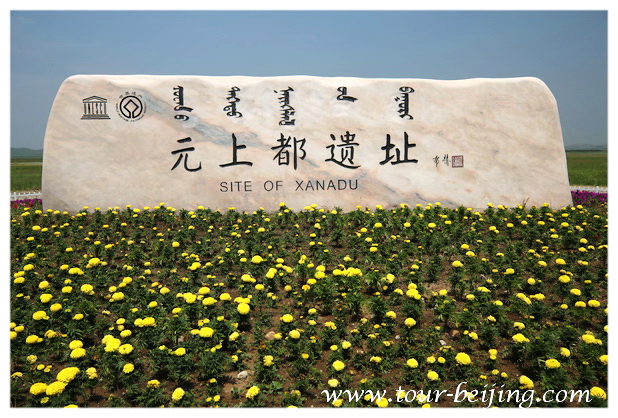
The Site of Xanadu is the site of a grassland capital characteristic of cultural fusion, witnessing clashes and mutual assimilation between the nomadic and agrarian civilisations in northern Asia (whc.unesco.org).
Location of Site of Xanadu
If you want to google “Site of Xanadu”, you’d better use the word “Yuanshangdu” ( Upper Capital in Yuan Dynasty in mandarin). Now Google Map recognizes “Site of Xanadu” as “Yuanshangdu Relic Site”.
Yuanshangdu Relic Site is located about 37km to the northwest of Duolun County, 27km to the northeast of Zhenglan Banner. See the map below:
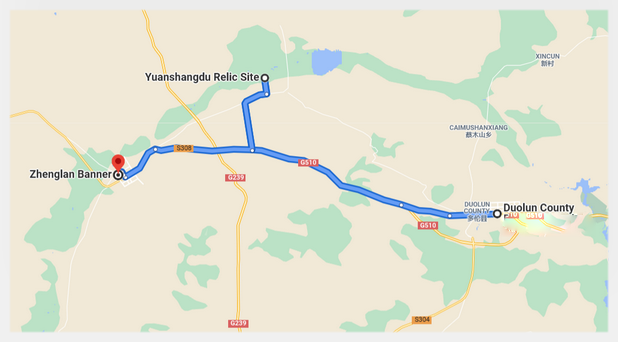
How to Get to Yuanshangdu Relic Site
Basically, people usually combine the Site of Xanadu and Xanadu Sites Museum on a day trip. The two attractions are 7km apart. You may come to visit the Site of Xanadu from Duolun County or Zhenglanqi County (Zhenglan Banner).
Google Map uses Yuanshandu ( mandarin) instead of its old name Xanadu. So you can easily find the Yuanshangdu Relic Site on Google Map, which is also known as the Site of Xanadu.
You’d better off arranging your own transport to visit the two places since there is no public transport connecting Zhenglanqi (Zhenglan Banner) or Duolun Country with the two sites. Even there is no bus service between the Site of Xanadu and Xanadu Sites Museum.
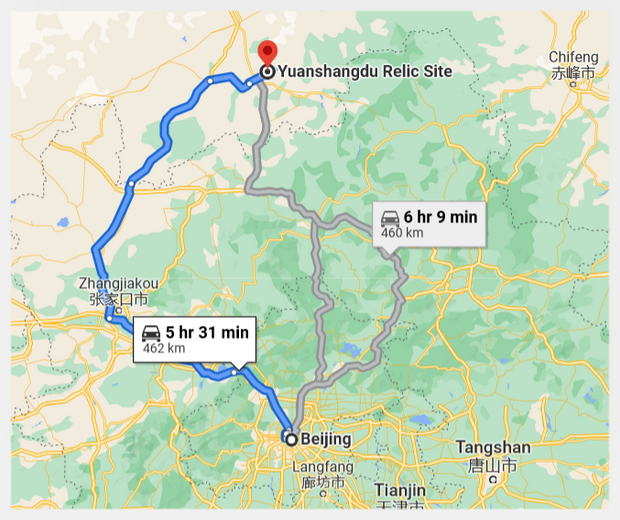
Yuanshangdu Relic Site is about 460km north of Beijing. You may arrange your own transport going to the relic site directly by road from Beijing. Overnight you may choose to stay either in Zhenglan Banner or Duolun County.
Virtual Tour of the Ruins of Xanadu
I take a taxi from my hotel in Duolun County and drive along the wide National Highway 510 to the west, then turn to the north along the provincial highway X517, soon I get to the Site of Xanadu, a scenic 38km drive.
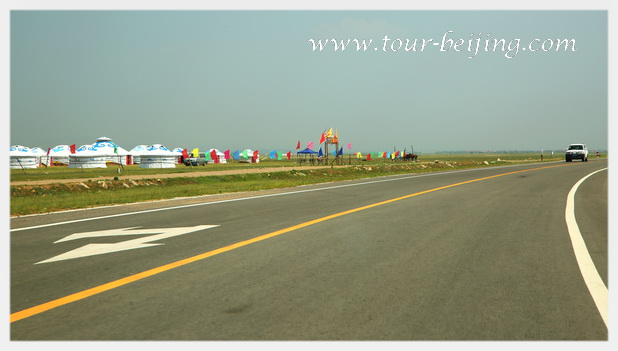
The ticket office is designated in a huge yurt. The entrance fee is 40 yuan per person. The electric golf carts within the relic site cost 10 yuan per person , good for those who don’t have strong legs since the relic site park is quite expansive.
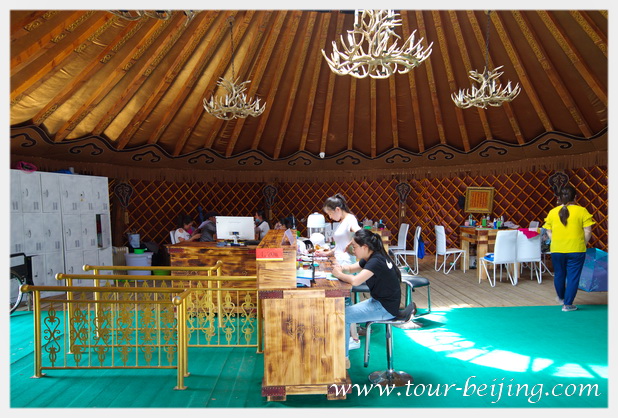
In the ruins of Xanadu, a spectacular civilization, a masterpiece of the multi-culture mix was discovered. It was a green city built by the nomads in Yuan Dynasty incorporating multi civilizations. The site was a unique attempt to assimilate the nomadic Mongolian and Han Chinese cultures.
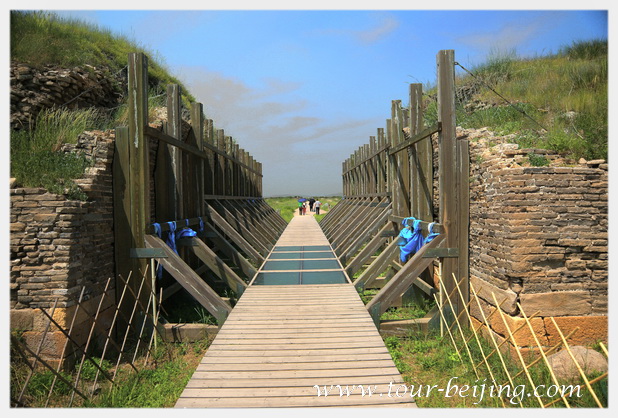
The city, originally known as Kaiping, was later renamed Xanadu. The plan of Xanadu, with Palace and Imperial cities enclosed partly by the Outer City containing evidence of the nomadic encampments and royal hunting enclosure, comprises a unique example of this cultural fusion (whc.unesco.org).
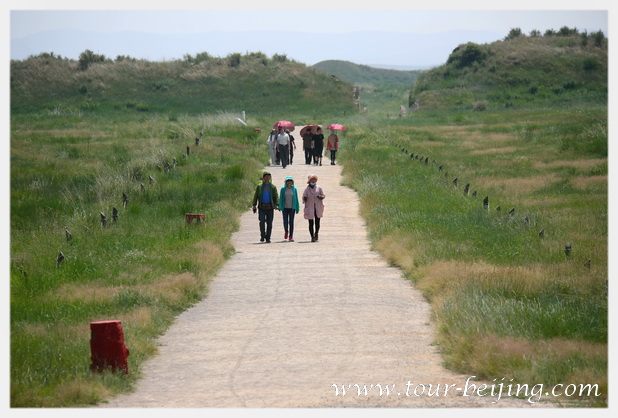
Today, only the ruins remain, and surrounded by a grassy mound that was once the city wall.
The famous Venetian traveller Marco Polo visited Xanadu (Shangdu) in about 1275 was received by Kublai Khan in the city. In his book, He described the city of Xanadu: “A city called Xanadu (Shangdu), which was constructed by the Khan who is now in power.”
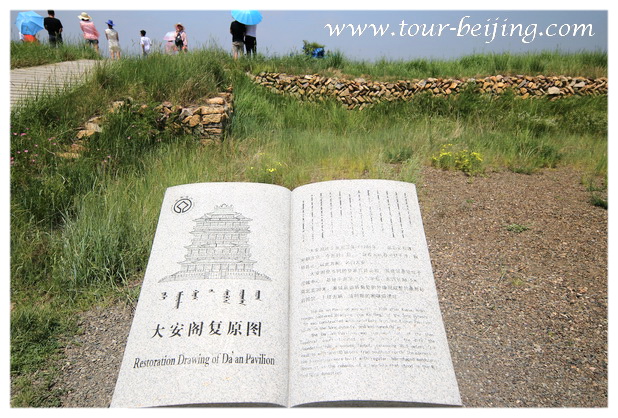
There are many palaces built out of stones in the city. All the houses are covered with gold and decorated with the pictures of birds, animals and flowers.
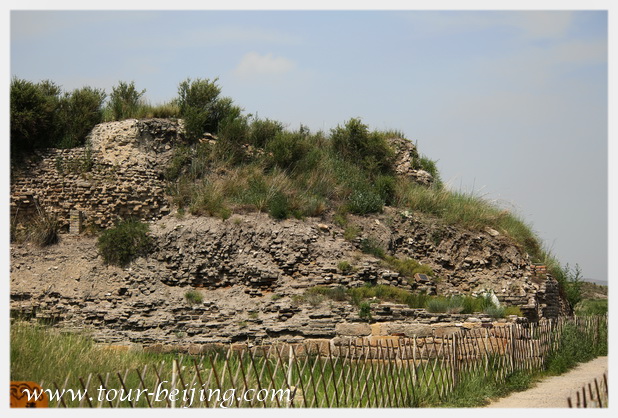
The Royal Road in the Palace City.
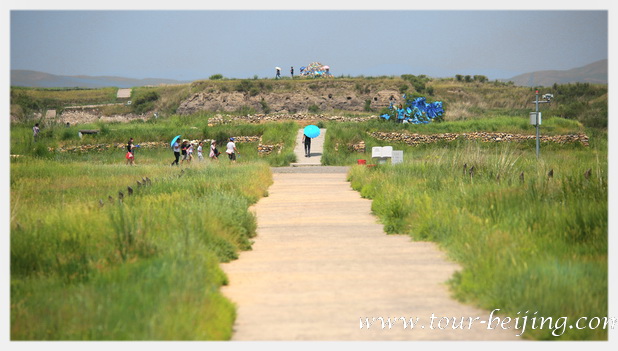
These buildings and patterns are so pretty that they are appealing to the eye.” From what Marco Polo described, we can imagine how prosperous and luxury the city was at that time. Muqing Pavilion – the living place for emperors.
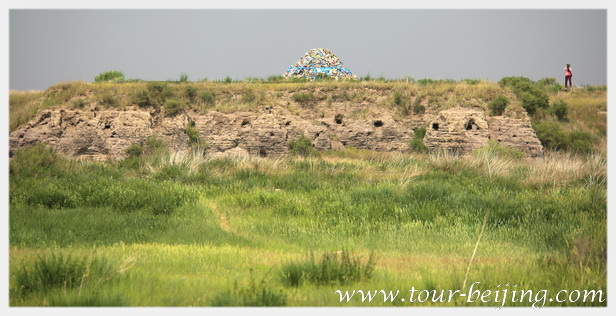
The design of the upper capital reflected the layout of a traditional Han Chinese city and at the same time incorporating the habit of Mongolians’ nomadic life style. The grassy mound that was once the imperial city wall.
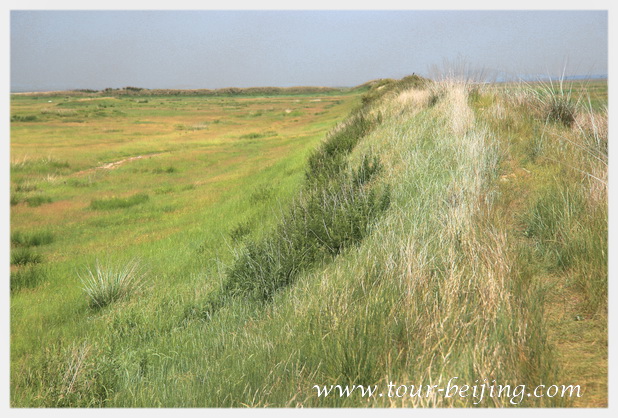
In 1369 Xanadu was taken and destroyed by the Ming army. The Site of Xanadu was abandoned in 1430. Today, only the ruins remain, and surrounded by a grassy mound that was once the city wall.
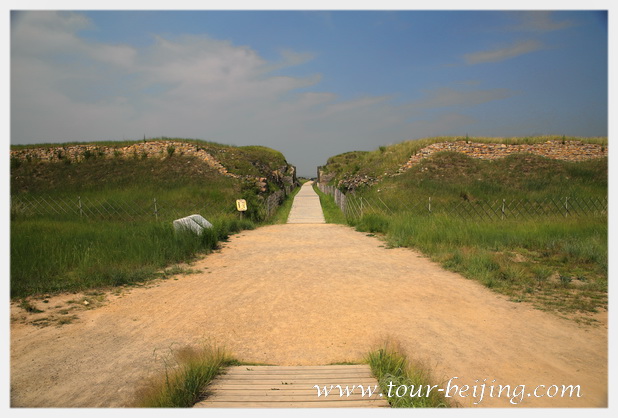
The plan of Xanadu, with Palace and Imperial cities enclosed partly by the Outer City containing evidence of the nomadic encampments and royal hunting enclosure, comprises a unique example of this cultural fusion (whc.unesco.org).
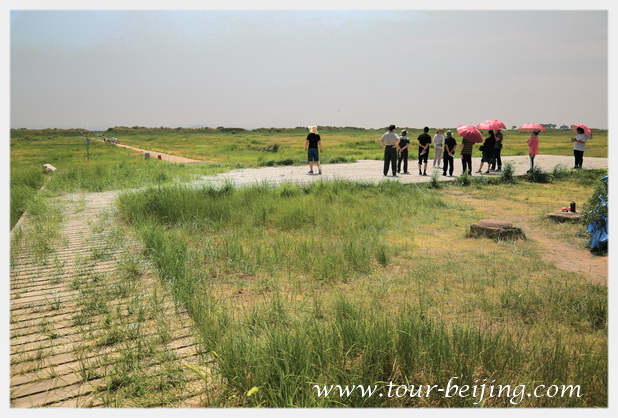
Xanadu was immortalized as Xanadu by English poet Samuel Taylor Coleridge, who wrote the well-known poem titled Kubla Khan. Coleridge’s description of Xanadu has the elements of the works of both Marco Polo and Samuel Purchas.
In his description of Xanadu, Marco Polo wrote: ” The Palace circled by a wall, inside the Park there are fountains and rivers and brooks and beautiful meadows, with all kinds of wild animals”. Thanks to the poem by Samuel Taylor Coleridge, Xanadu has become a metaphor for splendour and prosperity.
On Friday, June 29, 2012, Xanadu (China) was listed as the World Cultural Heritage.
Jinlianchuan Grassland ( Xar Tala )
Jinlianchuan Grassland or Globeflower Grassland abounds in wild plants and animals. It is a natural pasture and a also resort for horse riding, hunting and taking shelter from summer heat.
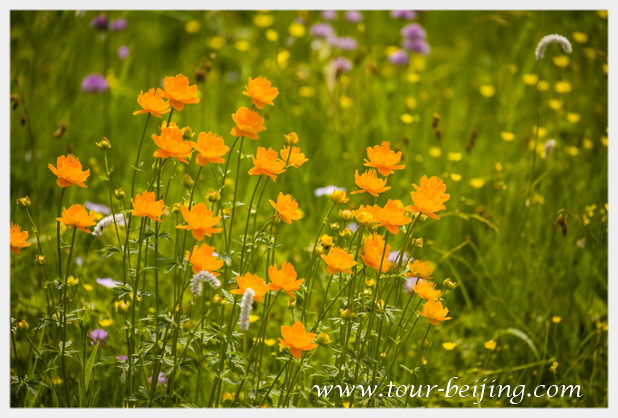
It used to be a summer resort for the emperors of Liao, Jin, Yuan and Qing dynasties. Now much part of Jinlianchuan Grassland is located within the ruins park of Xanadu.
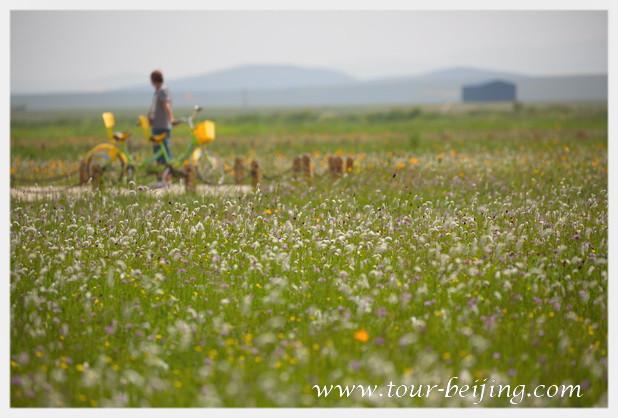
On the way from the entrance to the actual site of the Xanadu ruins you will see the grasslands on both sides of the road dotted with golden globeflowers.
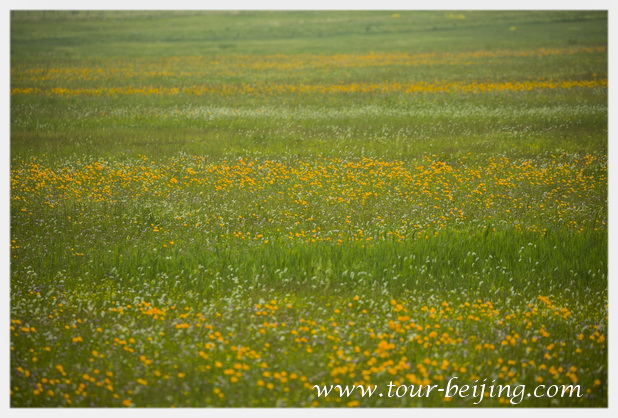
Xandii Gool ( Xanadu River)
Xandii Gool is the upper reach of Today’s Luan River with a length of 82 km. It is regarded as the ” Holy River” the local Inner Mongolian herdsmen. Now it is also the wetland among Jinlianchuan Grassland.
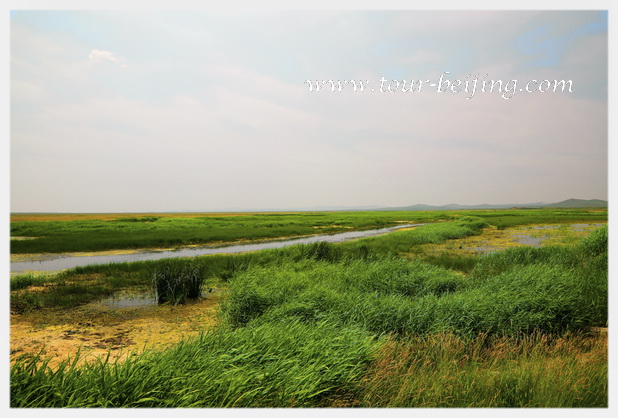
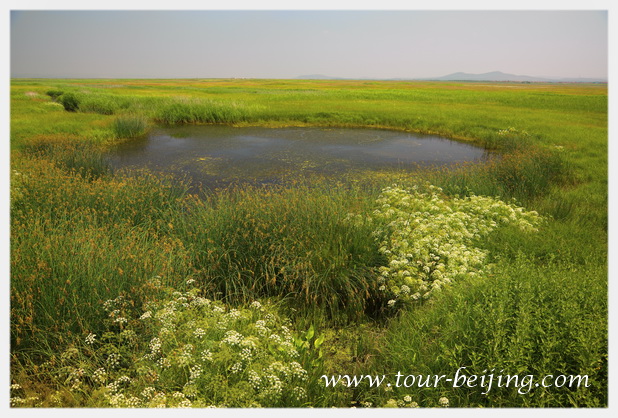
Add-on
Site of Xanadu (Tips, Photos & Map)
Xanadu Sites Museum
Jinlianchuan Grassland
Wulanbutong Grassland
Asihatu Stone Forest
Gong Geer Grassland
Duolun Travel Guide
How to visit Asihatu Stone Forest
Xi Wuzhumuqin Grassland
Top 10 Attractions in Chifeng
Hassle-Free Private Tour to Visit Xanadu and other parts of Inner Mongolia
If you don’t want go the daunting do-it-yourself-route and prefer an organized hassle-free private tour to visit Xanadu and other parts of Inner Mongolia, no worry and we have the following options:
3 Day Beijing Shangdu (Xanadu) Tour
4-Day Beijing Xilinglo Glassland Shangdu Mongolia Culture Tour
Inner Mongolia Tour
Mid-Inner Mongolia Tour (Hohhot, Baotou, Ordos)
East Inner Mongolia Tour (Xanadu,Wulan Butong, Xilinhot, Chifeng)
Northeast Inner Mongolia Tour (Hulunbuir)
West Inner Mongolia Tour (Alashan “Alxa” League)
Hohhot Tour
Hohhot Highlights & Grassland 3 Day Tour
Hohhot Highlights & Grassland 2 Day Tour
Further Readings
Top Places to Visit in Inner Mongolia
Top 10 Attractions in Hohhot
Best Time to Visit Hohhot
Meidaizhao Temple
How to go to Hohhot from Beijing
Top Souvenirs in Hohhot
Hohhot Taxi: Hohhot Taxi Fares, Tips and Phones
Baotou Taxi: Baotou Taxi Fares, Tips and Phones
Ordos Taxi: Ordos taxi Fares, Tips and Phones
What to see in Hohhot, what to do in Hohhot
Top 10 Attractions in Alxa League
Heicheng Historic Site in Ejin Banner (Tips, Photos & Map)
Guai Shu Lin in Ejin Banner, Inner Mongolia (Tips, Photos & Map)
Populus Forest in Ejin Banner (Tips, Photos & Map)
Badain Jaran Desert (Tips, Photos & Map)
Sunrise Glow over Hulunbuir Grassland
Top 10 Places for Photography in Hulunbuir
How to visit Hulunbuir Grassland
Top 10 Attractions in Hulunbuir
Hulun Lake Travel Tips
World Anti-fascist War Hailar Memorial Park
Road Trip from Ergun to Linjiang Village
Ergun Travel Guide
Aoluguya Travel Guide
Moerdaoga Travel Guide
Shiwei Travel Tips
Wusu Langzi Lake (Tips, Photos & Map)
Dujuan Lake in Aershan National Forest Park
Beihu Park Skyline at Night in Manzhouli
Night View of Manzhouli City
Architecture of Manzhouli
Top 10 Attractions in Manzhouli
Any questions, just drop a line.
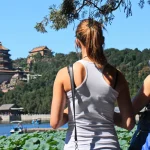

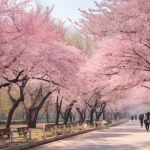


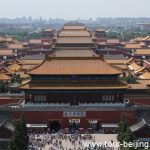
We would like to visit the museum and world heritage site at Yuanshangdu. We arrive in Hohhot on 1 May 2014 and intend to take the train to Sanggedalai. Can you advise of hotel in Sanggedalai and then bus or taxi to Yuanshangdu or is it possible to organise a mini tour with a yurt stay in the area? We only have 2 days available in our schedule as we have to be in Hailar by 4 May. Thank you.
Hello Joanna Spencer,
One of Tour Beijing Staffers will contact you soon.
I’m looking at the possibility of visiting Shangdu for Beijing over Dragon-Boat festival and am looking for info on where to stay and how to get there.
Hello Marcus,
The site of Shangdu is about 468km north of Beijing. The drive trip takes about 8 hours. Personally I suggest you hire a vehicle to go to Shangdu. You may stay at a local hotel in Zhenglan Qi 正蓝旗(Zhenglan Banner) which is located 27km to the southeast of Shangdu or you may stay at Duolun County(多伦), 65km to the south of Shangdu. Just for your reference.
Do you organise short trips to the site of Xanadu (Shangdu) with an overnight stay say at Duolun?
I am in Luanping Hebei and want to visit the site in the next week or two.
I guess that the best way to visit is to take a bus or a coach on first day, visit the site on the second. and return on the third day.
Could you advise on my options.
best wishes Chris Sharp
Dear Chiris Sharp,
At present we don’t organize join-in short trips to the site of Xanadu due to the small niche market.
Yes, you try to take a bus going to Duolun, then hire a local taxi for the site.